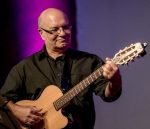Mauro Perelmann is coming from Brazil to lead a Dec. 17 musical tribute to Naomi Shemer and Leonard Cohen. (photo by Natan Guterman Fotografia)
On Dec. 17, Congregation Beth Israel will host a tribute concert to Israeli singer songwriter Naomi Shemer. The brainchild of Brazilian musical director, composer and arranger Mauro Perelmann, who appeared at Or Shalom last winter, the tribute show was originally created for a performance in Rio de Janeiro, Brazil. Following its success there, Perelmann is bringing the show to Vancouver, featuring local singers Stephen Aberle, Debby Fenson and Wendy Rubin.
The Vancouver concert – which will also include a tribute to Canadian icon Leonard Cohen, who passed away since the initial plans were made – is the result of extensive collaboration both internationally and within the Jewish community here. With the help of Perelmann’s friend Yom Shamash and sponsored by Congregation Beth Israel, Limmud Vancouver and Or Shalom, the concert features Shemer’s “best and most beautiful songs,” said Perelmann.
The archetypal Sabra, Shemer was born in 1930 at Kvutzat Kinneret, the Galilee kibbutz her parents helped found. Like other celebrated artists, she served in the Israel Defence Forces as part of the Nahal entertainment group, and went on to study at the Rubin Academy of Music in Jerusalem, now the Jerusalem Academy of Music and Dance.
After studying both classical and folk guitar in his home city of Rio de Janeiro, Perelmann followed in Shemer’s footsteps at the Rubin Academy. He studied there for a period of four years, 1976-1980, and it changed his life.
Raised in a secular Jewish home, both he and Shamash were members of Hashomer Hatzair, the Zionist youth group. Perelmann described his time in Israel as “a very touching experience, very important to my life.” On returning to Rio, he said, “I began to work as a musician, composer, arranger in Brazil. I returned to klezmer, to Hebrew and Israeli music. I began to work here in the Jewish community.”
Nowadays, Perelmann’s work follows “three branches,” he said: Jewish music; vocal music for choirs and other groups; and soundtracks for television and movies.
With only two weeks between his arrival in Vancouver and the concert, Perelmann has rehearsed with the three local singers via Skype. It was the first time he had used this technology to rehearse music.
“I sent them the scores with the voices written down and we used the technology to shorten the distance between us. It worked well! They went to the same place, I heard them singing, gave them feedback. When I arrive in Vancouver, we’ll rehearse with the whole band.”
Perelmann speaks passionately of Shemer’s compositions. He referred to her as “the voice of Israeli culture until the 1970s: the love of nature, of the people,” and added, “any Jew raised with music must know Naomi Shemer.” He described a wide-ranging repertoire, from touching love songs like “Umbrella for Two,” to lyrics describing scenes of everyday Israeli life, childhood and nature. Shamash described Shemer as the representation of “our idealized vision of a just, socialist and Zionist Israel.”
Concert-goers can, of course, look forward to hearing Shemer’s most celebrated work, “Yerushalayim Shel Zahav.” Made famous by Shuli Natan’s passionate renditions, it is a hauntingly nostalgic work, commemorating the end of the Six Day War of 1967. Combining a magical mix of open-hearted optimism and steely conviction, Shamash commented, “it was a kind of national anthem,” which united both a country and a generation of Jews around the world.
While it is widely regarded as a second national anthem of Israel, the song is not without controversy. In response to questions about the origins of the melody in Basque folk music, Perelmann said, “it happens in music; it wasn’t a conscious decision.”
And Shemer is known to have raised questions from Amos Oz, and others, over the perceived politics in “Yerushalayim Shel Zahav.” Describing the Jerusalem marketplace as “empty” without Jews, one might imagine that Shemer’s song disregards the presence of Arab Israelis. However, as Perelmann explained, Shemer clarified, “If there are no Jews there, then it is empty to me.”
Among the other Shemer songs to be featured at the Vancouver concert are “Al Kol Eleh,” “Hurshat Ha’Eucalyptus” (her song about the trees of Kvutzat Kinneret), “Lu Yehi,” “Orhim Lakayitz” and “Mahar.”
Vancouver singer Fenson treasures memories of “sitting around a campfire singing songs,” and described a lifelong relationship with Shemer’s music. “I received a book of Naomi Shemer songs for my bat mitzvah,” she shared. “Part of learning to speak Hebrew came from reading and singing those songs. Later, I used Naomi Shemer’s songs (and others) to help a friend who was also learning the language.”
As for the Cohen component of the concert, Shamash said, “The idea to add a small tribute to Leonard Cohen came from the Canadian singers…. The news of Leonard Cohen’s passing hit everyone hard, especially because it came two days after Donald Trump’s election. All of a sudden, the world looked darker and the need to grieve and mourn became more urgent. We all needed to see the light through the cracks of the broken world. I was asked to call Mauro to add a few Leonard Cohen’s songs. He understood. Hallelujah.”
The Shemer and Cohen tribute at Beth Israel on Dec. 17 starts at 8 p.m. Tickets are available at brownpapertickets.ca or at the door.
Shula Klinger is an author, illustrator and journalist living in North Vancouver. Find out more at niftyscissors.com.

